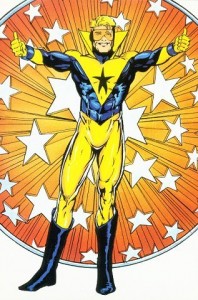An ode to Booster Gold
It’s funny how everyone has a guilty pleasure - a band, movie or book that we love but was hardly a critical or commercial success. Comic book fans are no different. They always have at least a couple of characters that they hold dear to their heart.
I know that I’ve got a few. There’s one name that’s always at top of mind for me though: Booster Gold.
Never heard of him? That’s cool, most people haven’t. Indeed, it’s a running joke on an episode of Justice League Unlimited that everyone thinks that he’s Green Lantern and they’re disappointed when they find out that it’s Booster Gold.
Booster Gold is Michael Jon Carter, a collegiate football star from the far-flung future of the 25th century. He started placing bets on his own games and then threw them for profit. Disgraced, he became a night watchman at a museum that housed artefacts from the so-called Age of Heroes – our modern heroes like Superman and Batman.
With the help of a floating security robot named Skeets, Booster stole equipment and weapons from the displays, and used Rip Hunter’s time machine to travel to the 20th century. When he arrived in the 1980s he used his limited knowledge of historical events to position himself in the right place at the right time and become a superhero brand that would save lives as well as turn a healthy profit.
With Skeets acting as a roving encyclopedia, Booster blunders from heroic episode to heroic episode, often doing more harm than good while trying to create a public image that he can gain from financially. Recently (and somewhat improbably) he's become the guardian of the time stream, trying to maintain order and balance in the universe.
There are two things that appeal to me about Booster: his origin and how well he reflects the zeitgeist of the 1980s.
I think that the best fictional characters, superheroes and otherwise, have origins that explain their motivation for the rest of their existence. Sticking to comic books, some Batman, Spider-Man and the Punisher are popular because they are driven by a combination of guilt and anger over the death of their beloved family members.
All three of those creation stories make sense. To an extent, the reader can understand why these guys are dressing in spandex and putting their lives in danger. Their behaviour is clearly motivated by the tragedy in their origins.
Booster Gold’s driving force is simple: he’s greedy. He covers his uniform with corporate logos, puts money on the stock exchange before big bumps and is generally a glory hog. Or that time he married a sexagenarian for her money. It's not an altruistic reason for becoming a superhero, but it has an inherent logic. You can get what he’s about.
Just as Captain America was ideally suited to the surge of patriotism in the lead up to World War 2 or Marvel heroes like Iron Man and Nick Fury fit the Cold War era, Booster Gold’s 1986 debut was perfectly timed. He was just right for the greed is good, egotistical 80s. He developed as a character into the 1990s, just as corporate monopolies disguised as “synergy” and mass sponsorship became the norm in North America.
Booster Gold is often under-utilized but instantly appealing to anyone who grew up in the 1980s. He’s greedy, funny, a little bit cynical and surprisingly heroic. More than just about any other big name comic book character he fits into our contemporary worldview and, most importantly, he’s believable. The reader can understand why he does the things he does. He’s as real as a man from the future can be, and although he’s a guilty pleasure of mine, I rarely regret it.
